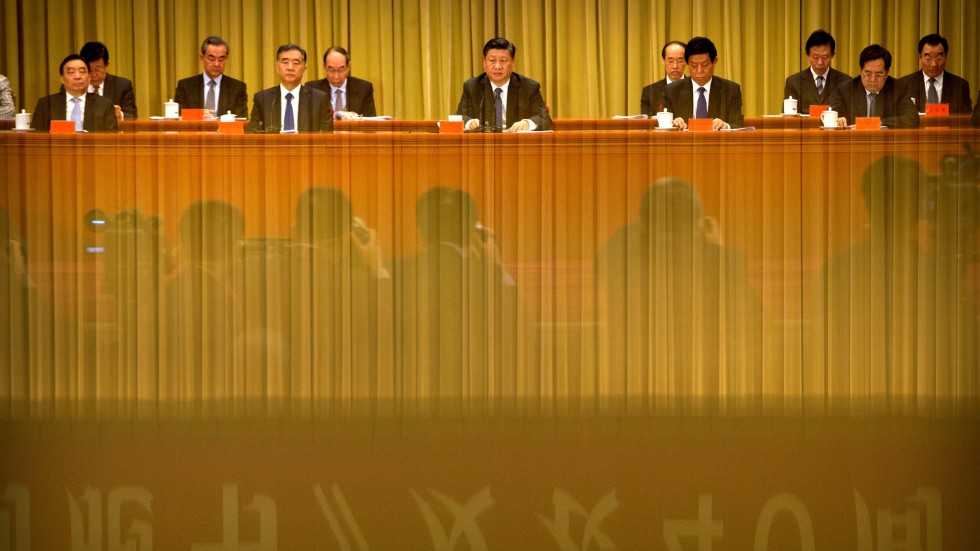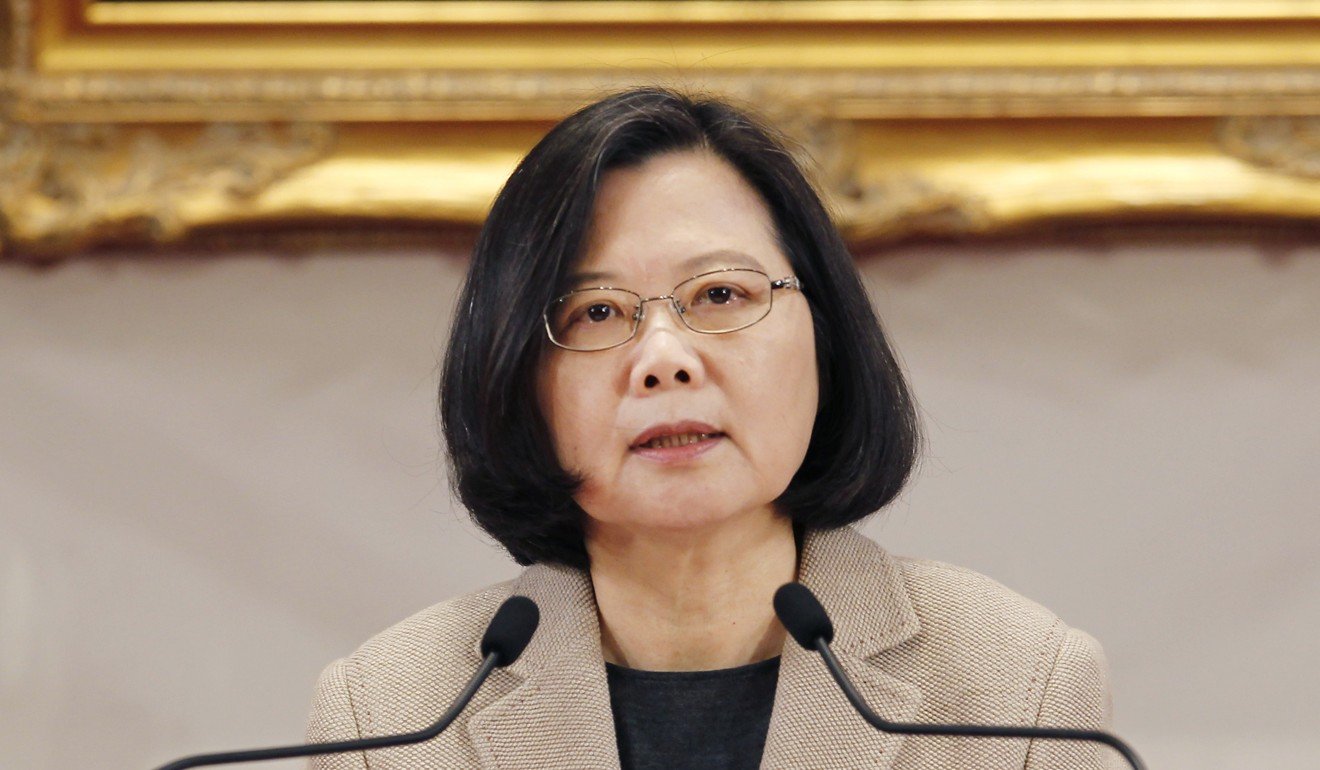
Chinese President Xi Jinping called on Beijing and Taipei to start talks on unification and adoption of “one country, two systems” in Taiwan, laying out steps to settle the 70-year-old divisions between the two sides.
In a speech on Wednesday to mark the 40th anniversary of a call from Beijing to end military confrontation across the Taiwan Strait, Xi said unification was key to “national rejuvenation”.
“The political division across the strait … cannot be passed on from generation to generation,” he said, apparently signalling his determination to end the separation between the self-ruled island and mainland China.
“The problem of Taiwan existed because the Chinese nation was weak and in chaos, but it will end along with national rejuvenation.”
Xi said Taiwanese independence should not be tolerated and representatives from both sides should “start in-depth democratic consultations for a cross-strait relationship and the future of the Chinese nation, and reach transitional arrangements for the peaceful development of cross-strait ties”.
He said China would not abandon the use of force for unification, but stressed that the military would only target external elements and those seeking independence for Taiwan.
“Chinese people will not fight Chinese people,” he said.
Taiwanese President Tsai Ing-wen, however, rejected Xi’s claim that the one country, two systems model was the way to resolve cross-strait conflicts.
“I must reiterate here that Taiwan will never accept one country, two systems, and the majority opinion in Taiwan is also against it,” she said just hours after Xi’s speech.
And on matters of unification, she said, only talks held at the government level carried any weight.
Taiwan and the mainland have been divided since the Nationalist, or Kuomintang, forces were defeated by the Communists in a civil war and retreated to the island. In the seven decades since, relations across the strait have often been tense, raising fears of military confrontation.
On January 1, 1979, Beijing stopped decades of regular artillery bombardment of Taiwan-controlled islands off the mainland, and in a public letter to the Taiwanese known as the “message to compatriots in Taiwan”, called for an end to military confrontation across the strait.
A day before Xi marked the anniversary of the letter, Taiwanese President Tsai Ing-wen, from the pro-independence Democratic Progressive Party, said Taipei would not give any ground on sovereignty and Beijing should appreciate that the “Republic of China, Taiwan” had existed for a long time.
Also this week, US President Donald Trump signed into law legislation to bolster Washington’s ties with Taipei.
Shanghai and Taipei rebuild city-to-city cross-strait ties after Taiwan’s local elections
But Xi said Taiwan must be united with the mainland, adding that the division was a trauma for the Chinese nation that people on both sides should overcome.
“The Chinese dream [of national rejuvenation] is the common dream of compatriots across the strait,” he said, using a slogan to promote China’s aspirations to be a strong power by the middle of the century.
“No one and no force can change the fact that Taiwan is part of China, and the historical and legal fact that both sides of the strait belong to one China.”
Xi said the differences in political systems between the two sides should not be obstacles to unification, and could be resolved through one country, two systems – an approach adopted for Hong Kong and Macau to ensure the two cities’ political and economic systems remained intact after handover.

“The introduction of one country, two systems is originally for taking care of the conditions of Taiwan and protecting the interests and benefits of Taiwan compatriots,” he said.
“The social system and lifestyle of Taiwan compatriots will be fully respected, and their private property, religion and legitimate interests will be fully protected after peaceful unification, and on the condition that national sovereignty, security and development are guaranteed.”
Xi said the mainland welcomed exchanges with all political parties and organisations in Taiwan based on the one-China principle and the 1992 consensus – an agreement reached by both sides that there is only one China but each side can have its own interpretation of what that means.
The Chinese president’s call comes amid a prolonged suspension in contact between Beijing and Taipei. The mainland suspended communication after Tsai took office in 2016 and failed to recognise the consensus, which Beijing insists is the foundation for any direct links.
Taiwan President Tsai Ing-wen tells Beijing it ‘must’ respect island’s sovereignty, people’s choices
In addition, Beijing has staged military drills near the island, wooed away some of Taipei’s diplomatic allies and cut the number of mainland tourists allowed to make the trip across the strait.
But it has also made it easier for Taiwanese people to work and do business on the mainland.
Xi also said the mainland would step up economic cooperation and youth exchanges with Taiwan, and urged people in Hong Kong to support reunification efforts.
Martin Lee Chu-ming, founding chairman of the Democratic Party in Hong Kong, was sceptical of Xi’s call to apply one country, two systems in Taiwan.
“One country, two systems is valid for 50 years in Hong Kong. How long will it last for Taiwan?” he said.
People in Taiwan were concerned about the mainland authorities’ growing influence on the city, such as attempts to advance national security legislation, he said.
“Taiwanese people who look at Hong Kong will see the changes over the past 20 years.”
Lee said he was also concerned that Xi’s “democratic consultations” would end up with mainland officials dictating directives without consulting or respecting the views of the Taiwanese.
Ip Kwok-him, a Hong Kong deputy to the National People’s Congress, said “one country, two systems” was the way forward for Taiwan.
“One country, two systems means the government needs to make sure both socialism and capitalism do well. Look at Taiwan’s economy – it’s in a mess under Tsai ... while mainland China’s economic power has been very strong,” he said.
Ip added that in the recent elections in Taiwan, several DPP candidates were defeated by KMT rivals.
“It shows that the people in Taiwan also want the island’s economy to do well,” he said, adding that Hong Kong had shown that “one country, two systems” could succeed in a capitalist economy and that the city was “thriving with the mainland’s support”.
“Under the ‘one country, two systems’ principle, Taiwan will maintain its autonomy, and there is much room for discussion under this principle,” Ip said.
Lau Siu-kai, vice-chairman of The Chinese Association of Hong Kong and Macau Studies, a semi-official think tank, said that while Taiwan might be able to negotiate its own terms within the one country, two systems framework, the model was not popular with people living on the island, especially in light of the situation in Hong Kong.
Lau noted that Xi did not say in his speech that one country, two systems worked well in Hong Kong.
“Knowing that many Taiwanese have mixed or even negative feelings about how one country, two systems works in Hong Kong, it is understandable that Xi didn’t mention it,” he said.
Additional reporting by Choi Chi-yuk, Kristin Huang and Tony Cheung







